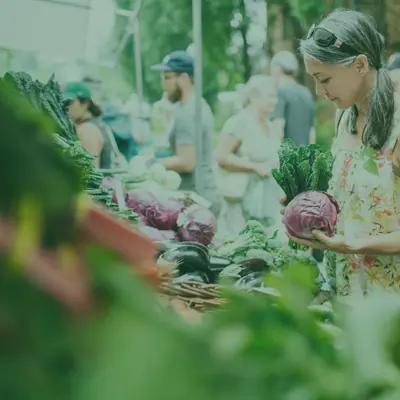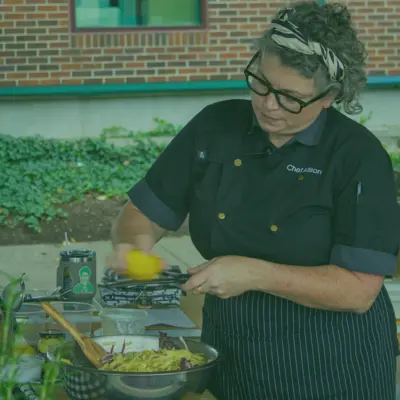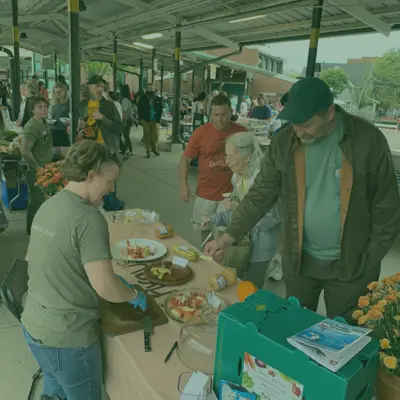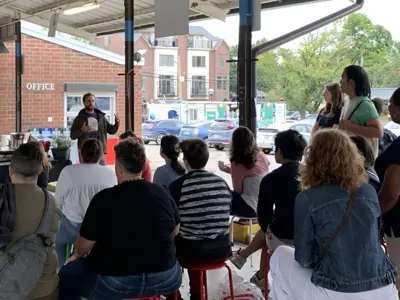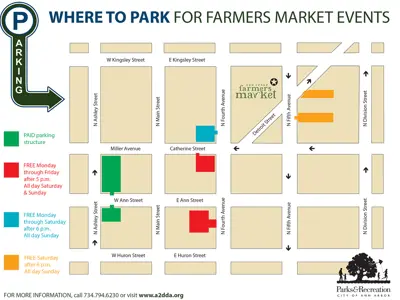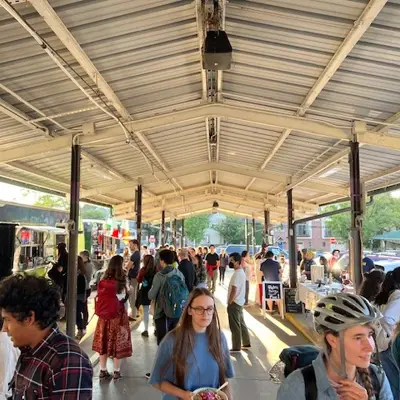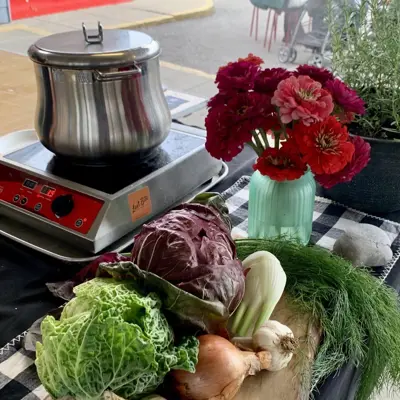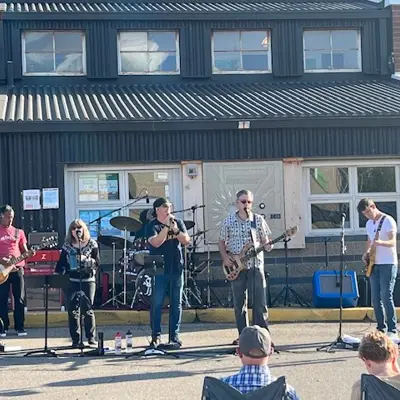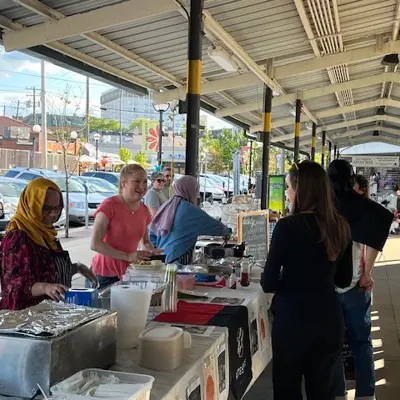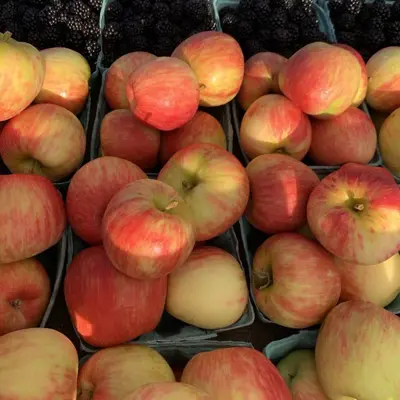Save the Date for the 2026 Local Food Festival!
Thursday, August 27th, 2026 | 5:00-8:00 pm | Ann Arbor Farmers Market
We're looking forward to welcoming the Ann Arbor Local Food Festival, Ann Arbor's annual celebration of Michigan food and farming, back to the Ann Arbor Farmers Market on August 27th!
This free public festival showcases farms, food makers, and local organizations focused on growing a strong and sustainable local food system. Festival goers will learn about the benefits of local and sustainably grown food, eat delicious local food, participate in fun and educational activities, and enjoy music.
What to Expect at Local Food Festival
The Local Food Festival features delicious food and fun activities for attendees of all ages. Stop by on August 27th, 2026 from 5:00 - 8:00 pm to spend an evening with friends and family while celebrating local food and farming!
Get Cooking with Seasonal Chef Demos!
Experience the vibrant flavors of Michigan's harvest with special chef demonstrations by local food educators and renowned chefs!
In 2025, our featured chefs were Chef Joseph VanWagner, Executive Chef at Echelon Kitchen and Bar, and Chef Dugan Walser, Chef at Washtenaw Community College.
Come hungry to learn! Free samples will be provided.
Get inspired by storytelling & skill sharing!
Gather around the storytelling circle and skill share stations to hear inspiring stories from local leaders and build your knowledge about how to use local foods!
2025 featured storytellers include: Scott Roubeck (Food Gatherers Community Kitchen), Lucia Ruedenberg (Community Farm of Ann Arbor), Caitlin Burr (C'mon Betty), and more!
Sample Local Produce at the Tasting Table!
Stop by the Tasting Table to sample the freshest seasonal fruits and veggies from local farms! Discover the rich variety of flavors in our region's harvest, learn about the people behind the produce, and see what makes each veggie unique. Don't forget to cast your vote for your favorite bite of the day!
2025 Featured Farms:
2025 Food Vendors & Community Exhibitors
Find out who's coming to the Local Food Festival
Are you a local food business or community organization interested in participating in the Local Food Festival?
Email Azella Markgraf, OSI Sustainable Food Coordinator, to be added to the early notification list for next year's event!
Getting to the Festival
Event Location: Ann Arbor Farmers Market | 315 Detroit Street, Ann Arbor, MI
The Local Food Festival takes place at the Ann Arbor Farmers Market, located at 315 Detroit Street, Ann Arbor, Michigan. The market is conveniently located in Ann Arbor's Kerrytown district, which is centrally located within the city.
Walk or Bike
The Ann Arbor Farmers Market is located a short walk or bike ride from downtown Ann Arbor. You will find bike racks on Fifth Ave and Detroit Street. For more information on biking in Ann Arbor, including a map, please visit the City's biking web page.
Bus
The Ann Arbor Farmers Market is located along several AAATA bus routes (stops for routes 22, 33, 61, and 65). The market is also just four blocks from Blake Transit Center (stops for routes 3, 4, 5, 6, 22, 23, 24, 25, 26, 27, 28, 29, 30, 31, 32, 33, and 34).
Drive
The market parking lot will be closed during this event. Please find parking elsewhere around Kerrytown.
There are several public parking lots and garages within walking distance of the market. Parking garages are located at Ann and Ashley, and Fourth and Washington streets. Metered parking is available at Fourth and Catherine (temporarily unavailable due to construction), Ann and Main, and First and Huron streets.
Frequently Asked Questions
Is the festival free to attend?
Admission to the Local Food Festival is free, however food and drink will be available to purchase from participating food & farm vendors.
Where is the festival located?
The Local Food Festival takes place at the Ann Arbor Farmers Market. The market is located at 315 Detroit Street, Ann Arbor, MI.
Is there drinking water available at the event?
Yes, free drinking water will be available at the event. Be sure to bring your refillable water bottle - there will be a water station at the Local Food Festival where you can fill it up!
Is the festival a zero waste event?
At the Local Food Festival, we're committed to reducing waste and protecting the environment. Every disposable item we avoid helps us keep our landfills smaller and achieve our community sustainability goals, which include moving towards a local circular economy, where resources are used efficiency and waste is eliminated!
We encourage all attendees to bring their own reusable eating utensils, cups, and containers. It's a small action that makes a big difference!
If you're unable to bring your own - have no fear! Many of our vendors & exhibitors will provide compostable or recyclable food ware. Waste station with dedicated bins for compost, recycling, and landfill waste will be located throughout the festival.
Will the festival still happen if it rains?
The Local Food Festival is a rain or shine event. Please check the forecast before coming and plan ahead!
In the event of severe weather, such as severe thunderstorms, extreme temperatures, or poor air quality, the event organizers will make a decision about cancellation by no later than 3:00 pm on August 28th. Please check our social media, @a2zero2030 on Instagram and @A2Zero on Facebook for the latest updates.
Due to food safety restrictions, only licensed service animals are allowed inside the market.
Why does supporting local farmers & food producers matter?
There are many reasons to buy locally grown food, including:
- Local produce is often better quality and lasts longer than produce shipped from further away. Oftentimes the produce you purchase at the farmers market was picked the day before, rather than spending days en route to the store and additional time on the shelf. Local makes a difference for freshness!
- Local farms are often smaller in size and have growing practices that are gentler on the planet.
- Buying local builds the economy and puts money directly into the hands of farmers who grew it. Conventional grocery stores take the majority of the profits, often leaving 15% or less to go to the producer.
- Buying local supports increased food security for our community. The COVID-19 pandemic revealed the risk of having large supply chains. Investing in local food systems helps to increase food security for the community now and in the future.
SUMMER GAME 2025: LOCALFOODFEST
One of the great gifts of being a Michigander is that we don't have to look anywhere for food but home. With just local and in-season foods, we can have a world class food culture.
-Chef Joseph Van Wagner, Echelon Kitchen & Bar


